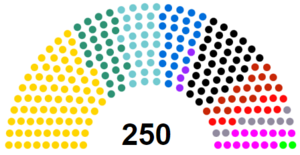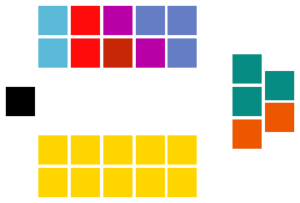Parliament of the Kingdom of Ahrana
This article is incomplete because it is pending further input from participants, or it is a work-in-progress by one author. Please comment on this article's talk page to share your input, comments and questions. Note: To contribute to this article, you may need to seek help from the author(s) of this page. |
Parliament of the Kingdom of Ahrana | |
|---|---|
 | |
| Type | |
| Type | |
| Houses | Assembly of Represetatives Chamber of Deputies |
| Leadership | |
Sigrid Anastasia Anne Victoria Florence-Goring of Strasburg | |
State Chanceller of the Federation | Auchild Larson |
State Councilor of the Federation | Nora Elisabeth Harpson |
| Structure | |
| Seats | 1800 Consisting of
|
 | |
Assembly of Representatives political groups | The Majority Party
The Minority Parties
|
 | |
Chamber of Deputies political groups | The Majority Party
The Minority Parties
|
| Elections | |
Assembly of Representatives voting system | Party-List PR |
Chamber of Deputies voting system | Party-List PR |
The Current Congress was elected through the 5th of October Federal Elections through the amount of Votes for each Party Nominee for the Office of Federal President of the Federation of Ahrana, since the last Federal Election the Presidium has laid down new Election Rules and a new Voting System to be only used for the Congressional Houses, Party-List PR will be used next Election cycle. The Congress is the Highest Legislative Authority of the Federation a level of Authority granted to the Chambers by the Constitution of the Federation and her member Republics.
Both Houses of Congress meet in the Capital, Moskovo, in the Legislative Palace while the Houses are in session, the Houses are in Session Three Quarters of the Year with the last Quarter being open for the Elections. At the beginning of each year both Houses must agree to a budget for an entire Year and a Half, if they fail to do this the Presidium and in right of the Powers of the Federal President may dissolve the Congress and call for Fresh Elections.
Federal Assembly
The Federal Assembly is considered the Lower House of the Congress due to the Fact its the Assembly of the People, the Constituencies Elect their Delegate to Represent them and to refer Legislation that needs the Approval of the People when needed. The Delegate is elected to a Four Year Term that may be only renewed Once while they serve, within that Four Year term there are Midterms every two years and exactly One-Third of the Assembly are up for a Confidence Vote by their Constituency if they lose the vote then the People elect a new Delegate to Represent them for the Former Delegates remaining Term.
Their are 1500 Seats in the Assembly which makes it the Biggest Assembly in all Legislative History of the Federation to date. The Federal Assembly will Directly Elect from among the Members of the Assembly to be Vice President of the Assembly, Constitutionally there are two Vice-Presidents of Assembly under the Chancellor of the Federation which is the Executive Representative of the Federal Assembly. While the Chancellor is an Executive Representative they in right of Authority of the Independence of the Assembly hold no Legislative Power while sitting in the Federal Assembly. The Chancellor my use their vote only to broker a tie in the Assembly, the Vice-Presidents are the true Power Wielders in the Assembly Having the right to dismiss a debate, call for a debate, or even veto a Law before reaching a vote.
Chamber of Federal Republican Deputies
The Chamber of Federal Republican Deputies or sometimes called the Chamber of Deputies, is the Upper House of the Congress of the Federation due that it is the smallest of all Assemblies in the entire History of the Federation. The Constituencies Elect Members that are called Deputies (hint why it is also called the Chamber of Deputies) that are elected to Represent the People in their Constituencies and to make the final decisions of the People for the People. The Deputies are elected to a Four Year Term renewable only once during their term, within that four year term on there are Midterms, just like the Federal Assembly, and exactly One-Third of the House is up for a Confidence Vote by the People of their Constituency. However unlike the Assembly the Deputy does not have to have the full Confidence of the People of that Constituency to stay in Office, they may remain in Office until either the Replacement-Elect or the Deputy Vice-Presidents deem that it is in-fact time for them to leave Office. The reason for this is so that the Incumbent Deputy may ready the Office with certain Legislation and so on for the Replacement-Elect or Deputy-Elect when they are sworn into Office, this so called Grace-Period only last for a Month until the Decision by the Deputy-Elect and Deputy Vice-Presidents are made. Normally the Out-going Deputy is placed into the Deputy-Elects Office to help that Deputy run his Office and Constituency.
Their are 300 Seats within the Chamber of Federal Republican Deputies which is small compared to the pervious Upper Chamber which held 550 Seats under the Socialist Government. The Chamber Elects a Deputy Vice-President from amongst the members of the Chamber, Constitutionally there are two Deputy Vice-Presidents under the State Councilor of the Federation which is the Executive Representative of the Chamber of Federal Republican Deputies. While the State Councilor is an Executive Representative of the Chamber they hold no true Legislative Power while sitting in the Chamber, they may only use their Vote to broker a tie in the Chamber. The Deputy Vice-Presidents hold the true Legislative Power but are under the advice of the State Councilor whom only advises in extreme cases of State Matters such as Matters of War, Internal Affairs Hearings and so forth. The Deputy Vice-Presidents cannot veto and Law until it has motioned and carried on through debate, they may only Veto the Law if only the Law is a violation of the Constitution or State Secrecy or other matters of State.
Congressional Committees
Both Houses of Congress have the Same Congressional Committees and Sub-Committees in-order to ensure the same amount of Legislation and Co-Operation between both Houses are and does Happen during each Congressional Session.